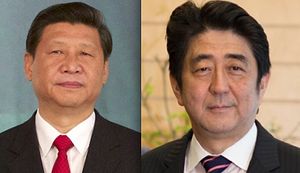There is no doubt the current Sino-Japanese relationship is in deep trouble. Since Japan decided to nationalize Diaoyu/Senkaku islands in 2012, China and Japan have been in a very cold political relationship, which has also negatively affected their economic relationship. Before 2012, many analysts used the term “hot economics, cold politics” to describe Sino-Japanese relations; but after 2012 it gradually became “cold economics, cold politics,” though the bilateral economic relationship is still solid overall.
How can the two countries get out of this “double cold” trap? Many have put their hope on the upcoming possible Xi-Abe meeting at APEC next month. Although it is true that a Xi-Abe meeting, if realized, would bring some concrete benefits to Sino-Japanese relations, we should not expect too much from such a meeting for a set of reasons.
A big achievement of the Xi-Abe meeting, if realized, might be on the Diaoyu/Senkaku islands dispute. After all, it is this dispute back in 2012 that dragged Sino-Japanese relations into a big hole; thus it is only reasonable that both sides want to restore their relationship by reaching some kind of understanding on the Diaoyu/Senkaku dispute. According to some reports, Japan might make some concessions by acknowledging that there is in fact a dispute over the Diaoyu/Senkaku islands, though Japan would insist that the islands are still Japanese territory. Of course, one needs to be careful here not to expect too much from Japan; still, China would be able to declare some kind of victory if Japan in one way or another admits that there is a dispute. This would be a positive step towards an eventual peaceful resolution of the dispute in the future.
However, one should not be overly optimistic even if Japan admits that there is a dispute over the Diaoyu/Senkaku islands. As Peking University Japanese expert Yu Tiejun powerfully argued earlier this year, crisis control should be the top priority in Sino-Japanese relations. Yu pointed out that China should not let Sino-Japanese relations get out of control, and should especially avoid the spiral model of crisis escalation, which could have very uncertain consequences. A dangerous incident could still happen between Chinese and Japanese vessels, or between Chinese planes and Japanese fighter jets.
Moreover, structural factors seem to pose major obstacles to improving Sino-Japanese relations. China has hoped that Japan would take serious and genuine actions to show its new attitude toward history, which has plagued Sino-Japanese relations for decades. China’s attitude is very clear: if Abe simply wants to use a Xi-Abe meeting at APEC to improve Abe’s domestic position and image, then China would not play along. In a sense, from China’s perspective Abe has not earned their trust. In their eyes, Abe is just playing a game to win international public opinion by painting China as the one who refuses to cooperate.
Domestically, Abe is now having a difficult time as Abenomics has failed to deliver the kind of results that many had hoped for. Economic data show that inflation is low and not enough jobs have been created. China’s rise can help revive Japan’s economy, but its dispute with China and its attitude toward history prevent Japan from moving closer to China’s huge market. Politically, Abe is also in trouble as two of his ministers resigned over scandals. What all this means for Abe is that he is now distracted domestically and thus wont be able to make bold and important foreign policy decisions with regard to China.
This should not be surprising, though. Nobody expects Sino-Japanese relations to go back to normal in the near future. To some degree, it does not matter much whether or not there is an Xi-Abe meeting. A great deal remains to be done in areas such as history education, nationalism, economic competition, and so on for both countries. Under the current circumstances, none of the above issues will be resolved quickly. This, again, is the reason why crisis control should be the top priority for both countries. As long as a crisis does not escalate into a real military conflict, there is always room for peaceful negotiation. Being patient will be a big virtue in handling Sino-Japanese relations these days.

































